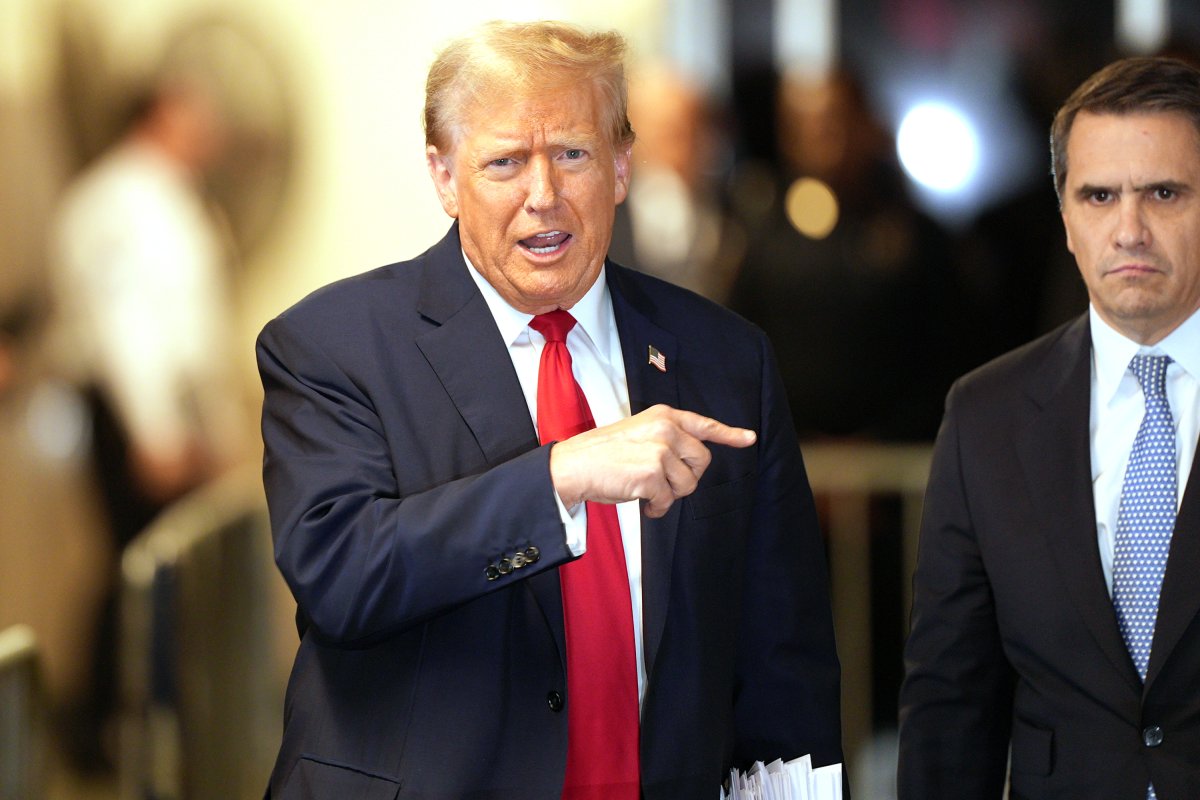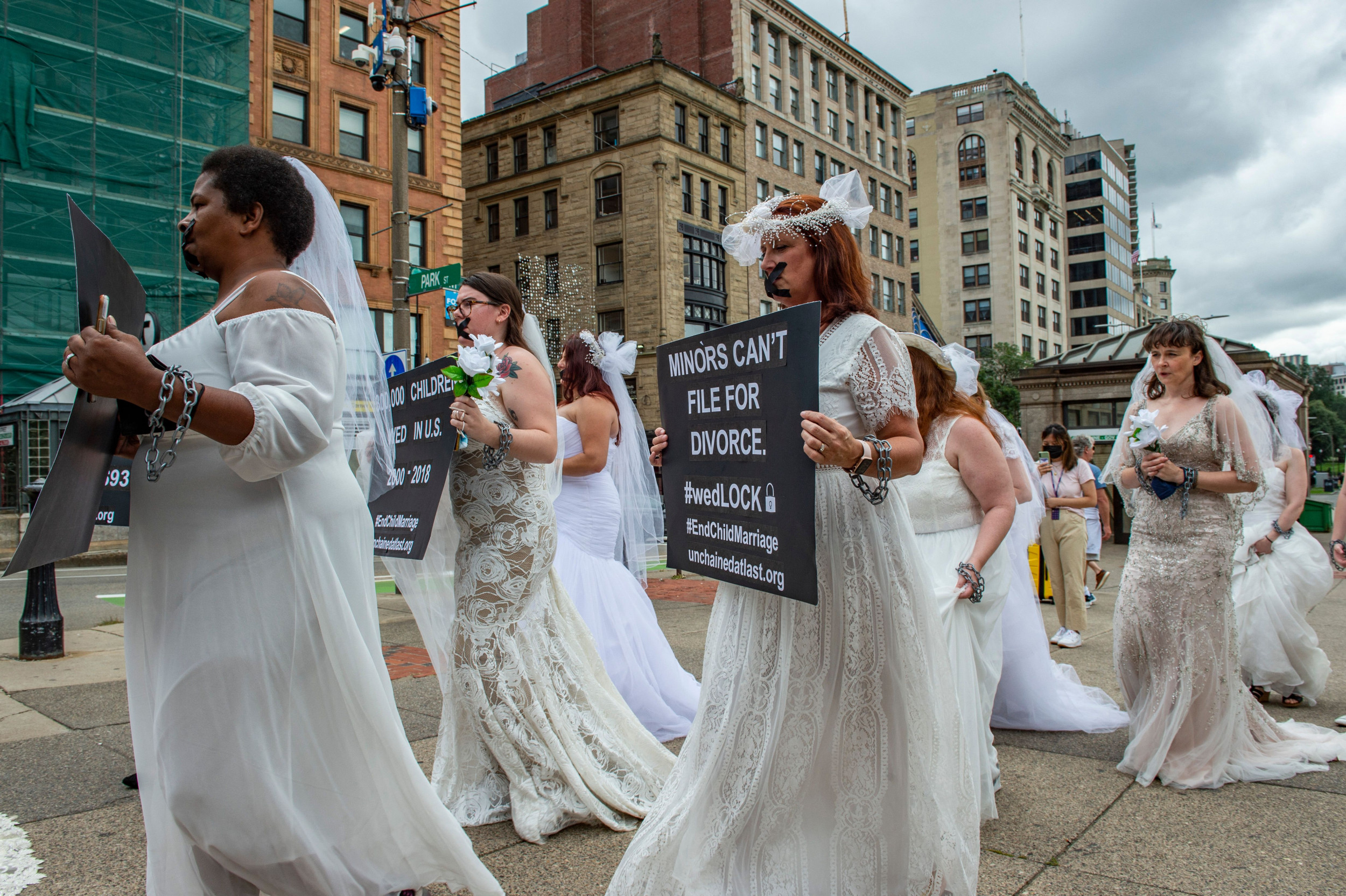Former President Donald Trump's campaign has been accused of spamming people with unsolicited campaign emails through third parties ahead of the 2024 election, including individuals from foreign countries who cannot vote.
Some people told Newsweek about receiving "annoying" emails advancing the presumptive Republican nominee's campaign, with one claiming they had been unable to unsubscribe from them.
There was no suggestion that the email activity is a breach of electoral rules. Email lists are often sold or rented to federal candidate campaigns and PACs for solicitation purposes. However, one company sending the emails may be breaching its terms of service by allegedly not allowing a user to unsubscribe. The email activity sheds light on how Trump's team is aiming to reach potential voters.
In response to Newsweek's request for comment, a Trump spokesperson requested screenshots or email addresses of people complaining about receiving unsolicited emails to check if the complainants previously signed up to receive correspondence manually. Newsweek did not comply with the request.

One U.K. citizen who spoke to Newsweek on the condition of anonymity said that since 2020, they had been sporadically receiving "unsolicited emails" from the blog Conservative Intel in support of Trump that they described as "spam." Conservative Intel is owned by email marketing firm Conservative Connector, which according to its Linked-In, provides its clients access to the conservative activist and donor email lists of elected officials and political organizations.
Since 2021, the Trump supporting PAC Save America JFC has spent $1,706,702.76 renting email lists from Conservative Connector, according to a Newsweek analysis of FEC data. Financial information for Trump National Committee JFC, which launched in March, has not yet been made publicly available.
The emails, seen by Newsweek, said that the communications are paid for by the PAC as well as Trump National Committee JFC and other political actors and offer recipients the chance to unsubscribe, but the source claimed that attempts to unsubscribe have been unsuccessful.
One email, signed by Trump, asked recipients to vote for whom he should choose as a potential vice president. Another, also purporting to be from Trump, complained that his criminal hush money case in New York City is preventing him from campaigning and asked people to donate to his campaign.
Other emails were sent to the source by other political figures, including commentator Candace Owens and Arizona Republican U.S. House candidate Blake Masters.
The source said they have "never subscribed to anything political" leading them to believe their email address had "been sourced from the black market" and that Conservative Intel has ignored their request to be removed from its mailing list.
Newsweek reviewed four emails in which the source asked Conservative Intel to stop "pestering" and "spamming" them. They said the website did not reply to any of them.
In its privacy information, Conservative Intel says it collects users' email addresses when they directly subscribe to the website, something the source said they did not do.
The privacy policy information also says the blog may disclose certain information about its users to third parties for promotional purposes but that people can opt-out by contacting the website or unsubscribing from emails.
"If you do not wish to have your Personal Information used by the Company to promote our own or third parties' products or services, you can opt-out by replying to a marketing email with 'unsubscribe' in the subject line, clicking 'unsubscribe' in the marketing email itself, or by contacting us using the methods identified in this Policy at any time," it says.
While the source did not click 'unsubscribe' or email the blog with 'unsubscribe' in the subject line as per the policy, the emails clearly request that the communications from the blog stop.
The source told Newsweek: "I have written to conservativeintel.com a number of times in the past asking them to provide proof of when I subscribed and informing them that I am not a U.S. citizen, have no interest in them and to stop spamming me but these fell on deaf ears. No response from any of my missives and their pesky emails continue to arrive. Surely this is not a legitimate way to run a political campaign?"
Newsweek contacted Conservative Intel by email for comment.
Meanwhile, people on social media have also complained about receiving emails from Conservative Intel. One, Charles Kersey, said on X, formerly Twitter, that he had received emails through Conservative Intel from Republican Florida Senator Marco Rubio but has been able to unsubscribe.
@GoDaddyHelp @Godaddy I get campaign donation #SPAM from "braveconservatives
— Charles Kersey 🏴☠️ (@CharlesKersey) January 29, 2024com" that, when I checked, redirects to "conservativeintel com" which is hosted by GoDaddy. Spamming is against your #TOS. Suspend them. It's fucking @MarcoRubio & he's a shitbag. pic.twitter.com/lEgEKc57Q3
Alex Marland, a politics professor at Acadia University in Nova Scotia, Canada, said he has also received "a blizzard of emails promoting Trump" but does not know whether they are from Conservative Intel. He described the emails as "invasive" and said he had not signed up to any political mailing lists, leading him to believe his email address had been mined. Since he has deleted the emails, he was unable to confirm who sent them and Newsweek has not viewed copies of them.
"Last week, I too began receiving a blizzard of emails promoting Trump, many of which were in all-caps," he said. "It was quite annoying, and likewise I have not subscribed to any political parties' mailing lists, and certainly not American ones. Fortunately, when I clicked 'unsubscribe' the emails stopped immediately, and I haven't received any since.
"The emails were sent to my old email address from when I was a Memorial University employee and not to my current email address at Acadia University. Which tells me that the email was mined from the web given that my newer one is far less prevalent.
"It is a bit uncouth to compile email addresses from the Web and one might question the efficiency when [in my case] a Canadian is receiving them. While I found the emails annoying and a bit rude, as well as invasive, I was able to easily opt out. Which I cannot do with the barrage of solicitors in my neighbourhood knocking at my door, the flyers that I receive in my mailbox or the telemarketers who always seem to call at inopportune times. Or, for that matter, most of the email spam that I receive from hucksters."
News of the emails come as Trump's presidential election campaign against President Joe Biden kicks off in earnest with both passing the party delegate threshold in March to secure the nomination after winning multiple primaries across the country.
With less than seven months until Election Day, Biden has fundraised more than double the amount of Trump, who also has amassed substantial legal bills from his numerous cases. Trump is legally required to sit in a New York City courtroom for the foreseeable future for his hush money criminal trial while Biden is free to visit cities across the country and speak to voters.
This month, Biden's campaign told NBC News it hired 300 staffers across nine states and 100 offices in parts of the country that will influence the election. Trump, on the other hand, did not disclose campaign staffing levels.
Mark Shanahan, an associate professor in politics at the University of Surrey in the U.K., told Newsweek that Trump's was a "ramshackle" operation and that he was relying on email campaigning because his court battles mean he is spending less time on the campaign trail and because his social media influence has declined.
"The Trump campaign got lucky in 2016," he said. "Candidate Trump aligned perfectly with the zeitgeist. Every utterance became a news story, and each was amplified largely unfiltered through social media platforms such as Facebook and Twitter. His campaign didn't have to do much work, the burgeoning MAGA base flocked to his events and then talked endlessly about them across key social media platforms.
"In 2020, the Trump campaign tried to repeat this success, but you've only got one chance to make a first impression, and what had seemed fresh and different in 2016 was merely a hackneyed repeat of 'greatest hits' four years later. Biden was a wiser and wilier opponent than [Hillary] Clinton, and even though the Trump campaign worked intensely with Facebook on placing ads and stoking algorithms, much of their messaging was old news.
"The biggest problems they face in 2024 are two-fold. First, the candidate isn't on the campaign trail. While Biden moves around the country attacking Trump on key issues such as abortion, the GOP presumptive candidate sits brooding angrily in a court room and could face much of the campaign similarly prone. He simply isn't getting the campaign soundbites out there for traditional and social media to latch on to. Second, the big social media platforms that previously spread and amplified his messaging relatively cost-effectively to reach his intended audiences have either lost popularity and credibility [as in the case of X, the rebranded Twitter] or, as with the Meta platforms Facebook and Instagram, are actively withdrawing from political content.
"Trump hoped Truth Social would fill that void, but it has become the echoiest echo chamber, largely with the ex president shouting into the void. Post-Jan 6 , 2021, many of his campaign strategists have slipped away, and the 2024 team are younger, less well organised and seemingly, a little more desperate. The mailing lists are less well managed, the mailshots less refined, and in a number of states the campaign just doesn't have the strength on the ground to do the job properly.
"With Biden, the Democrats have a slick campaign for a slightly ramshackle candidate. On the Republican side, the whole affair seems ramshackle."
People on social media have also complained that Biden's campaign has sent unsolicited emails, with one source telling Newsweek he was able to unsubscribe from them. Newsweek did not receive a copy of the email to verify it and has contacted a Biden campaign spokesperson by email for comment.
Heath Brown an associate professor of public policy at City University of New York, said the email campaigns may "turn off" voters, telling Newsweek: "Each election cycle, candidates experiment with new campaigns technology to raise money and reach potential voters.
"As with any experiment, there are risks to trying something not-yet-proven to work. In 2024, the risks are especially high for any candidate who is using questionable email out reach.
"No candidate wants to be branded a Spam-didate. Spam-didates will turn off those who receive unsolicited emails and, even worse, everyone else who hears about it."
Uncommon Knowledge
Newsweek is committed to challenging conventional wisdom and finding connections in the search for common ground.
Newsweek is committed to challenging conventional wisdom and finding connections in the search for common ground.
fairness meter
To Rate This Article
About the writer
Kate Plummer is a Newsweek reporter based in London, U.K. Her focus is on U.S. politics and national affairs, and ... Read more
To read how Newsweek uses AI as a newsroom tool, Click here.








